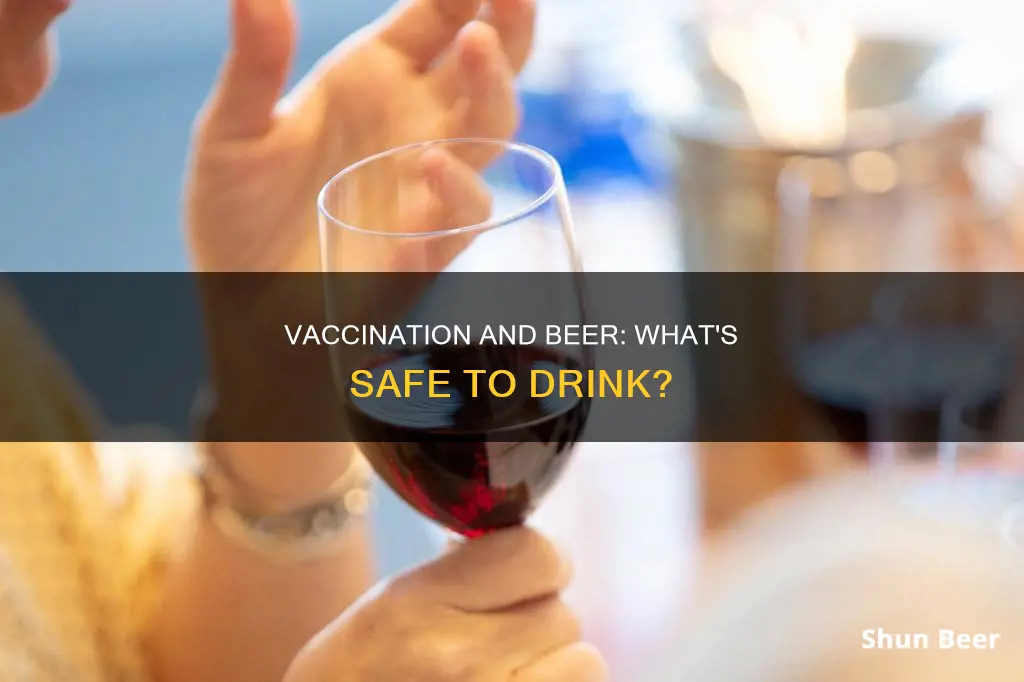
There is no official guidance on drinking beer or other alcoholic drinks after receiving a COVID-19 vaccine or booster. However, some experts advise against drinking alcohol, especially in large quantities, immediately after vaccination. While there is no evidence that moderate drinking will affect the efficacy of the vaccine, heavy drinking may suppress the immune system and interfere with your body's response to the vaccine.
What You'll Learn
- Moderate drinking is unlikely to impair the immune response to the COVID vaccine
- Heavy drinking may suppress the immune system and interfere with the vaccine response
- There is no official guidance on drinking alcohol after the COVID-19 vaccine
- Alcohol does not protect against COVID-19
- Experts advise against drinking alcohol after getting vaccinated

Moderate drinking is unlikely to impair the immune response to the COVID vaccine
There is no conclusive evidence that moderate drinking will affect the COVID vaccine's effectiveness. However, heavy drinking may hamper the body's ability to develop immunity against COVID.
Moderate drinking is generally defined as no more than two drinks a day for men and a maximum of one drink a day for women. Heavy drinking is defined as four or more drinks on any day for men and three or more drinks for women.
Alcohol and the immune system
Alcohol affects the immune system. Studies show that alcohol disrupts immune pathways and can impair the body's ability to defend itself against infection. Heavy alcohol consumption increases susceptibility to immune-related conditions such as acute respiratory stress syndrome (wet lung).
However, an older study on animals and humans suggested that moderate alcohol consumption, unlike chronic alcohol exposure, enhances the response to classical vaccines.
Alcohol and the COVID vaccine
A 2023 review found that alcohol may activate ACE2 receptors, which are the receptors for the COVID-19 virus, and enhance the harmful effects of the SARS-CoV-2 spike protein. The spike protein is located on the virus's surface and is the main target of antibodies trying to neutralize the virus.
The review also found that young people who drink alcohol and those who chronically drink alcohol have an increased risk of complications after immunization with the Oxford-AstraZeneca vaccine.
Other considerations
While there is no official guidance on drinking alcohol after the COVID-19 vaccine, some experts advise against drinking right after getting vaccinated. This is because hangover symptoms like fatigue, headache, and nausea may mimic or worsen the side effects of the vaccine.
Pouring Beer: Catfish Bait or Urban Myth?
You may want to see also

Heavy drinking may suppress the immune system and interfere with the vaccine response
While there is no conclusive evidence that alcohol affects the efficacy of the COVID-19 vaccine, heavy drinking may suppress the immune system and interfere with the body's vaccine response.
According to the National Institute on Alcohol Abuse and Alcoholism, drinking alcohol does not protect against COVID-19 and may impair immune function. Research has shown that heavy alcohol consumption can increase the risk of bacterial and viral infections. It can prevent immune cells from travelling to sites of infection and carrying out their duties, such as destroying viruses, bacteria, and infected cells. Heavy drinking can also make it easier for pathogens to invade your cells.
In addition, heavy drinking can amplify the side effects of the COVID-19 vaccine, such as fever, malaise, or body aches. Experts advise that it is best to avoid alcohol for a few days after receiving the vaccine. This is because the side effects of heavy drinking, such as fatigue, headache, and nausea, may mimic or worsen the side effects of the vaccine.
It is important to note that moderate drinking, generally defined as no more than two drinks a day for men and a maximum of one drink a day for women, does not seem to have the same negative effects on the immune system as heavy drinking. In fact, some studies have found that moderate drinking may even benefit the immune system by reducing inflammation.
Beer and the DASH Diet: What You Need to Know
You may want to see also

There is no official guidance on drinking alcohol after the COVID-19 vaccine
As of August 2023, there is no official guidance on drinking alcohol after receiving the COVID-19 vaccine. The Centers for Disease Control and Prevention (CDC) guidelines for people who have been newly vaccinated do not mention alcohol. Similarly, the Food and Drug Administration (FDA) vaccination fact sheets for the Moderna, Novavax, and Pfizer vaccines do not reference alcohol.
Some experts advise against drinking alcohol, especially heavy drinking, immediately after receiving the COVID-19 vaccine. However, there is no evidence that alcohol affects the vaccine's efficacy.
> Though there is no data on this, it is advisable to abstain or reduce alcohol intake for the first 48–72 hours after vaccination. This is the usual period one might expect common and usually mild after-effects of vaccination, like fatigue, muscle aches, injection site pain. — Jagadeesh Reddy, MD, infectious disease specialist
Research has found that alcohol does not affect the efficacy of the flu vaccine. However, some evidence suggests that drinking alcohol every day may increase the risk of severe reactions to vaccination.
A review published in 2016 noted that light-to-moderate drinking may improve the response to vaccination. In contrast, chronic heavy drinking has been shown to increase the risk of bacterial and viral infections. While there are many factors regarding alcohol intake and its impact on the body, more studies are needed to understand the full effects of alcohol on the immune system.
It is important to note that alcohol can alter your thoughts, judgment, and decision-making, making it harder to adhere to safer gathering practices like wearing a mask and social distancing. Additionally, drinking alcohol weakens your body's ability to fight infections, increasing the risk of complications and making it harder to recover if you are sick.
Drinking Beer and Driving: How Many is Too Many?
You may want to see also

Alcohol does not protect against COVID-19
There is no evidence that consuming alcohol protects against COVID-19. Alcohol is known to negatively impact health and increase the risk of violence, injury, and alcohol poisoning. During the COVID-19 pandemic, alcohol consumption can further exacerbate health vulnerabilities, risk-taking behaviours, mental health issues, and violence.
Drinking alcohol does not protect you from COVID-19. In fact, alcohol consumption can weaken your body's ability to fight infections, increasing the risk of complications and making it harder to recover from illness. Alcohol use can also increase the risk of acute respiratory distress syndrome and pneumonia, which are sometimes associated with COVID-19.
While there is no conclusive evidence that alcohol reduces the effectiveness of the COVID-19 vaccine, some studies suggest that alcohol consumption may negatively impact the immune response to the vaccine and potentially render it ineffective. Alcohol may activate ACE2 receptors, which are the same receptors that the COVID-19 virus uses to enter the body. Additionally, chronic alcohol consumption may exacerbate heart problems after receiving an mRNA COVID-19 vaccine.
Some experts advise against drinking alcohol, especially heavy drinking, immediately after receiving a COVID-19 vaccine or booster. Alcohol can cause side effects such as fatigue, headache, and nausea, which may be mistaken for or worsen the side effects of the vaccine. It is recommended to give your body time to recover from the vaccine and seek medical attention if you experience any adverse side effects.
Beer and Prozac: Safe Mix or Risky Business?
You may want to see also

Experts advise against drinking alcohol after getting vaccinated
There is currently no official advice or conclusive evidence that drinking alcohol affects the COVID-19 vaccine's effectiveness. However, some experts advise against drinking alcohol, especially heavily, immediately after receiving the vaccine.
Drinking alcohol has been shown to affect the immune response. Studies show that alcohol can disrupt immune pathways and impair the body's ability to defend itself against infection. Heavy drinking has been linked to an increased risk of bacterial and viral infections.
A 2023 review found that alcohol may activate ACE2 receptors, which are the receptors for the COVID-19 virus. It may also enhance the harmful effects of the SARS-CoV-2 spike protein, which is the main target of antibodies. The review also suggested that young people and chronic drinkers were at a higher risk of complications after receiving the Oxford-AstraZeneca vaccine.
Additionally, chronic alcohol consumption may worsen heart problems after receiving the mRNA COVID-19 vaccine. This could be a concern for those with undiagnosed cardiovascular issues.
While there is no conclusive evidence that alcohol affects vaccine effectiveness, some experts recommend avoiding alcohol for a few days after vaccination. This is because hangover symptoms like fatigue, headache, and nausea may mimic or worsen the side effects of the vaccine.
Until more is known about the effects of alcohol on the COVID-19 vaccine, experts advise against binge drinking for several days after vaccination.
Beer and Tetanus Shots: What You Need to Know
You may want to see also
Frequently asked questions
There is no official guidance on drinking alcohol after getting a COVID-19 vaccine or booster shot. However, some experts advise against drinking alcohol, especially heavily, immediately after getting vaccinated. This is because alcohol can cause side effects such as fatigue, headache, and nausea, which may be mistaken for or worsen the side effects of the vaccine.
Moderate drinking is unlikely to impair the immune response to the COVID-19 vaccine, but heavy drinking might. Heavy drinking can suppress the immune system and potentially interfere with your vaccine response.
Yes, there are some potential risks associated with drinking alcohol after getting a COVID-19 vaccine or booster shot. Alcohol can affect the immune system and increase the risk of acute respiratory distress syndrome and pneumonia, which are sometimes associated with COVID-19. Additionally, drinking alcohol can alter your thoughts, judgment, and decision-making, making it harder to adhere to safer practices such as wearing a mask and social distancing.
If you choose to drink alcohol after getting a COVID-19 vaccine or booster shot, it is important to drink in moderation and adhere to low-risk limits. It is also recommended to avoid combining alcohol with certain medications such as acetaminophen (Tylenol), as this can cause liver damage.







